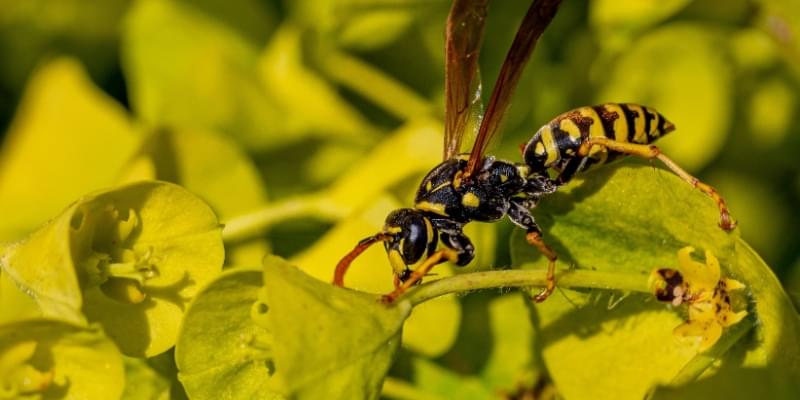Wasps can turn your peaceful backyard into a threatening environment, especially during the warmer months when these insects are most active. While wasps play a crucial role in ecosystems by controlling pest populations and pollinating plants, having them too close to home can be dangerous, particularly for those with allergies. If you're dealing with a wasp problem in your yard, here's a comprehensive guide on how to handle it effectively and safely.
1. Identify the Type of Wasp
Before taking any action, it’s essential to identify the type of wasp you’re dealing with. Common types include:
- Yellowjackets: Small, aggressive, and often found near food sources.
- Hornets: Larger than yellowjackets and known for their painful stings.
- Paper Wasps: Known for their long legs and umbrella-shaped nests.
Identifying the species can help you understand their behavior and the best way to approach the problem.
2. Locate the Nest
Carefully observe the wasps’ flight patterns to determine the location of their nest. Common nesting sites include:
- Trees and shrubs
- Eaves and overhangs
- Holes in the ground
- Wall cavities
Approach this step with caution. Disturbing the nest can provoke the wasps, leading to multiple stings.
3. Assess the Risk
Consider the level of threat posed by the wasps:
- Mild: If the nest is small and far from human activity, you might decide to monitor it from a safe distance.
- Severe: If the nest is large, in a high-traffic area, or if there are known allergies in your household, it’s time to take action.
4. Do Not Disturb the Nest
One of the worst things you can do is to disturb the nest without a plan. Aggressive wasps will defend their home, and multiple stings can be dangerous. Avoid using loud noises, vibrations, or sudden movements near the nest.
5. Use DIY Methods with Caution
If the risk is low, and you decide to tackle the problem yourself, here are some DIY methods:
- Wasp Traps: Commercial or homemade traps can reduce the population. Place them away from areas where people gather.
- Sprays: Insecticide sprays can be effective, especially those designed for wasp control. Apply them in the evening or early morning, when wasps are less active.
- Soap and Water: A mixture of soap and water can clog the breathing pores of wasps, killing them on contact. This method is best for smaller nests.
Always wear protective clothing and keep children and pets at a safe distance.
6. Professional Pest Control Services
For larger nests or high-risk situations, professional pest control services are the best option. Here’s why:
- Safety: Professionals have the experience and equipment to handle wasp nests safely, minimizing the risk of stings.
- Effectiveness: Pest control experts use specialized treatments that are more effective than over-the-counter solutions.
- Long-Term Prevention: A professional service can provide advice and solutions to prevent future infestations, such as sealing entry points and removing attractants.
7. Prevent Future Infestations
Once the immediate problem is solved, take steps to prevent future wasp infestations:
- Seal Cracks and Holes: Inspect your home and yard for potential entry points and seal them.
- Remove Attractants: Keep food and garbage covered, and avoid leaving sugary drinks or pet food outside.
- Maintain Your Yard: Regularly trim trees and shrubs, and clear away debris that can serve as nesting sites.
- Install Wasp-Repellent Plants: Certain plants, like mint, eucalyptus, and citronella, can deter wasps from settling in your yard.
8. Educate Your Family
Here are some important tips to teach your family about wasp safety:
- Stay Calm and Move Slowly: If a wasp is nearby, it’s crucial to remain calm and avoid sudden movements. Quick or erratic actions can provoke wasps, making them more likely to sting.
- Avoid Strong Fragrances and Bright Colors: Wasps are attracted to strong scents and bright colors, mistaking them for flowers. Encourage your family to avoid wearing floral perfumes and brightly colored clothing when spending time outdoors.
- Keep Food and Drinks Covered: During late summer and early fall, wasps are particularly drawn to sweet foods and beverages. Always cover food and drinks when eating outside, and promptly clean up any spills or leftovers.
- Inspect for Nests Regularly: Regularly check around your home for wasp nests, especially in sheltered areas like under eaves, in sheds, or in attics. If a nest is found, do not attempt to remove it yourself. Contact a professional pest control service for safe removal.
- Use Natural Repellents: There are several natural methods to deter wasps. Essential oils like peppermint, spearmint, and clove can be effective repellents. Create repellent stations by soaking cotton balls in these oils and placing them around your home and garden. This can help prevent wasps from building nests near your living spaces.
- Educate Children: Make sure children know to stay away from wasp nests and to report any sightings to an adult immediately. Teach them the difference between bees and wasps, and the importance of not swatting at these insects.
Dealing with a wasp problem in your yard requires careful assessment and a cautious approach. Whether you opt for DIY methods or enlist professional help, addressing the issue promptly and effectively can restore your yard to a safe, enjoyable space. By taking preventive measures, you can reduce the likelihood of future infestations, allowing you and your family to enjoy the outdoors without fear. If you’re ever in doubt or dealing with a severe infestation, remember that Trio Pest Control is here to help with expert solutions tailored to your specific needs.
